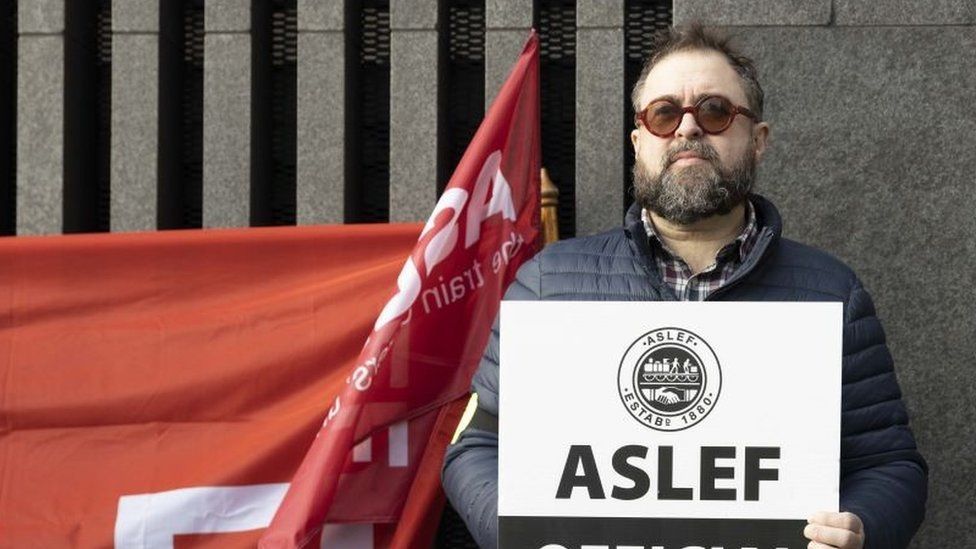ARTICLE AD BOX
 Image source, Getty Images
Image source, Getty Images
By Katy Austin
Transport correspondent
Train drivers may intensify their campaign of industrial action as they seek a breakthrough in the ongoing dispute over pay, their union leader has said.
Drivers at 15 train companies are walking out on Thursday, leaving some operators unable to run any trains.
Mick Whelan told the BBC his union now had a stronger mandate than before.
Frustrated members had told him Aslef was currently "not going hard and fast enough", he said.
A wave of industrial action is affecting sectors from the health and postal services to driving examinations, as people seek pay rises that keep up with the rising cost of living.
Rail workers in the RMT and other unions have taken part in a series of large scale strikes over more than six months.
Thursday marks the sixth day of action since last summer by members of Aslef, which represents most train drivers. The union expects 12,500 drivers at 15 train companies to take part.
"It may be we have to take greater action going forward, to make people listen," the union boss said.
"There is a vast will among our membership to continue," Mr Whelan added. "We're in this for the long haul."
The Aslef leader said that a pay rise was years overdue and no offer had yet been made by the Rail Delivery Group (RDG), the body which represents train companies.
The group's chair said they were getting closer to being able to put forward an offer.
Steve Montgomery told the BBC "sensible and reasonable reform" had to be on the table.
"I think we have done work with Aslef that can get us there," he told the BBC. "But it does mean both sides have got to start having meaningful discussions. So I do think we are closer but there's still further work to be done."
The two sides are seeking a broad brush agreement that would then have to be agreed at local level with all of the 15 train companies involved. Mr Whelan said it was possible no agreement would be reached within the next year.
Aslef and the RMT are expected to meet rail employers and the rail minister on Monday to try and find a way forward.
The government and the rail operators said changes are needed to working practices, to modernise the railway and make it more efficient - in order to fund higher pay.
But in an interview with the BBC, Aslef's Mr Whelan said what had been discussed did not, in his view, amount to reforms. "They've spoken to us about a long wishlist of productivity-for-nothing," he said.
The RDG's Mr Montgomery said they were not asking drivers to "do longer hours and receive less pay for it", but "asking people to be more flexible within that 35 hour week".
Mr Whelan however said that in talks with the Rail Delivery Group, there had been discussions about rostering and "tinkering around the edges". But there had been no "big ticket items" that would alter the current situation, he said.
The RDG chair responded: "Yes there is restraint, but it's because of the fact we are using taxpayers' money at this stage, and we believe we can bring sensible reform that will not cost the taxpayer anything further."
Asked about the unions' claims that the government was holding back a settlement, the RDG's Mr Montgomery said there was "restraint", but said "it's because of the fact we are using taxpayers' money at this stage." He added: "We believe we can bring sensible reform that will not cost the taxpayer anything further."
Mr Whelan said that because inflation had "gone through the roof" since Aslef first sought an offer, what was acceptable six months ago "may not be acceptable to our members now".
"We're chasing a pay rise that at least puts a dent in that inflation," he said.
A Department for Transport spokesperson said that both the transport secretary and the rail minister have so far had "polite, constructive" meetings with a range of union leaders.
"Passengers have rightly had enough of rail strikes and want the disruption to end. Unions should step back from strike action so we can start 2023 by ending this damaging dispute."
The RMT union previously rejected an initial offer by the Rail Delivery Group, saying the conditions attached were not acceptable.

 2 years ago
44
2 years ago
44








 English (US) ·
English (US) ·